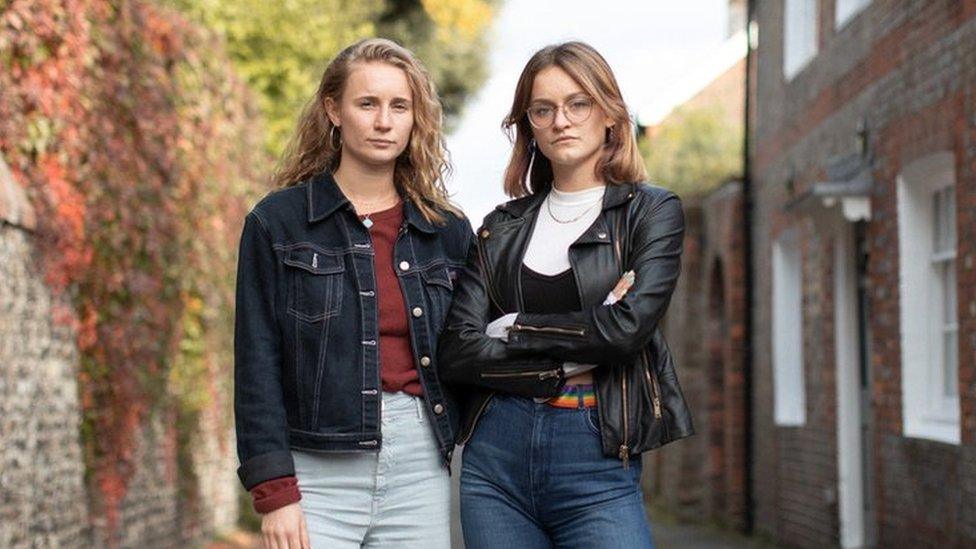Sarah Everard: Virtual and doorstep vigils held across the UK
- Published
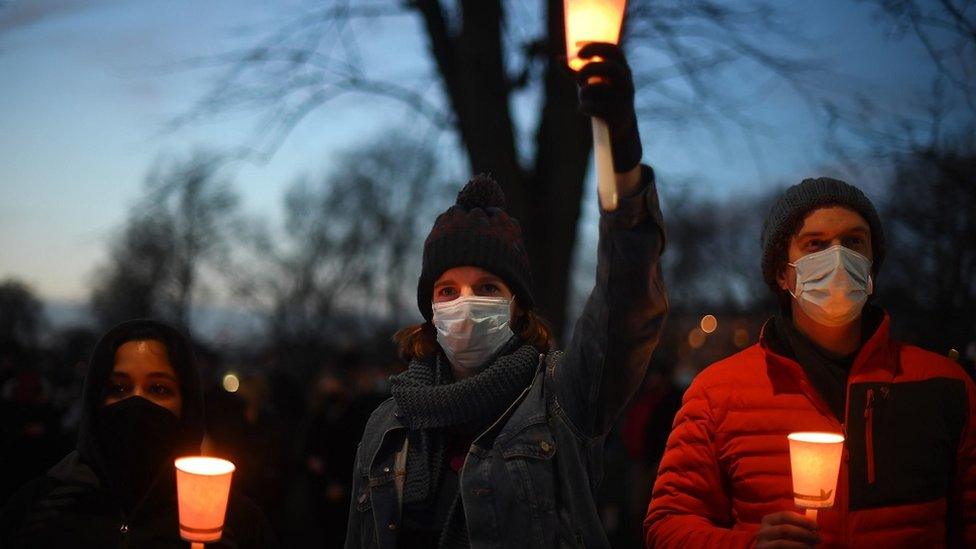
People held candles on Saturday evening on Clapham Common, where an official vigil was cancelled
The prime minister and the Duchess of Cambridge are among those to pay tribute to Sarah Everard as virtual and doorstep vigils are held across the UK.
Boris Johnson said he and his fiancee, Carrie Symonds, will join others in lighting a candle for the 33-year-old at 21:30 GMT.
Planned evening vigils were called off because of Covid restrictions, but hundreds gathered at Clapham Common.
It led to confrontation with the police who tweeted that it was "unsafe".
Lambeth police tweeted: , external"The gathering at #ClaphamCommon is unsafe. Hundreds of people are tightly packed together in breach of the regulations and risking public health.
"We are urging people to go home and we thank those who have been engaging with officers and who are leaving."
People gathered to pay tribute to Sarah Everard following her death in March
Earlier, Met Police officer Wayne Couzens, 48, appeared at Westminster Magistrates' Court charged with her kidnap and murder.
The organisers of a vigil in Clapham, south London, said earlier they were cancelling the event because police did not "constructively engage" with plans.
Reclaim These Streets asked people not to gather at Clapham Common, adding that doing so might put people "legally at risk".
They asked people to shine a light to coincide with the time Ms Everard was last seen on 3 March.
However, Sisters Uncut, which campaigns to prevent violence against women, said it planned to attend the Clapham vigil despite the organisers' cancellation.
Hundreds of women and men rallied at the bandstand as night fell, and there was some confrontation between them and the police.
One video posted online showed officers removing and leading away those women who were stood within the bandstand. Cries of "shame on you" and "let them go" could be heard from onlookers. The video showed them being put in a police van and driven away.
Sisters Uncut alleged in a tweet that "male police officers waited for the sun to set before they started grabbing and manhandling women in the crowd". This tweet has now been deleted.
Ms Everard's death has prompted women to share their own experiences, and a public debate over their safety.
Mr Johnson tweeted, external that he will "be thinking of her family and friends" when lighting a candle, adding: "I will do everything I can to make sure the streets are safe."
Scotland's First Minister Nicola Sturgeon tweeted a picture of a candle in her home, which she said was "for Sarah", while Wales's First Minister Mark Drakeford encouraged people to "ignite a fire for change".
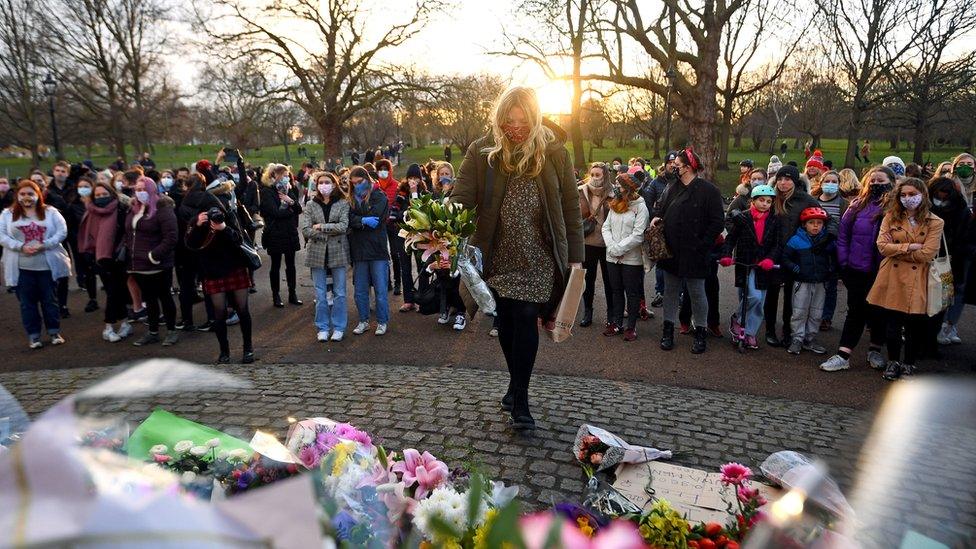
A memorial to Sarah Everard has been set up at Clapham Common's bandstand
Throughout the day, people gathered at its bandstand to lay flowers and pay their respects throughout the day.
It is understood that the Duchess of Cambridge wanted to pay her respects to Ms Everard and her family.
'Turning point'
During a virtual event hosted by Feminists of London, Mandu Reid, the leader of the Women's Equality Party, compared violence against women and girls to "a form of domestic terrorism", while TV presenter Sandi Toksvig said Ms Everard's death should be "a turning point".
Home Secretary Priti Patel said almost 20,000 people had responded in 24 hours to a consultation on how the government could tackle violence against women and girls.
Meanwhile, a fundraising page set up by Reclaim These Streets for women's charitable causes has reached its £320,000 target.
On Friday, a High Court judge refused to intervene in the Reclaim These Streets' legal challenge over the right to gather to protest during Covid restrictions.
Reclaim These Streets tweeted, external that the group had "repeatedly tried to find a way forward for the event", including staggering start times and splitting the event into time slots, but the Met Police had been "unwilling to commit to anything".
Anna Birley, of Reclaim These Streets, said holding the vigil would have put the group at "massive" legal risk for organising it, as well as risking women receiving fixed-penalty notices.
Caitlin Prowle, another organiser, said they did not want to end up in a situation where they were having to raise funds to pay fines.
Commander Catherine Roper, of the Met Police, said officers "take no joy in this event being cancelled, but it is the right thing to do given the real and present threat of Covid-19".
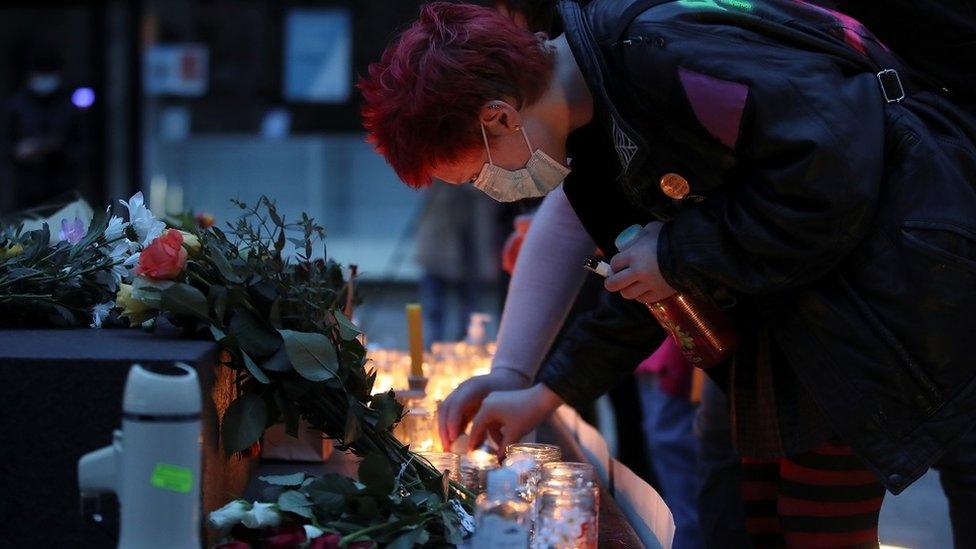
People gathered in Nottingham on Saturday evening - as well as in Glasgow and Bristol
Organisers for vigils due to be held across the UK, including in Edinburgh, Cardiff, Birmingham, Leeds, York, Sheffield and Brighton also cancelled events - with many holding virtual events instead.
Those behind a cancelled event in Glasgow asked people to tie ribbons and notes to trees and fences, a move which they said would be turned into a "manifesto for change" for real improvements in the lives and safety of all women.
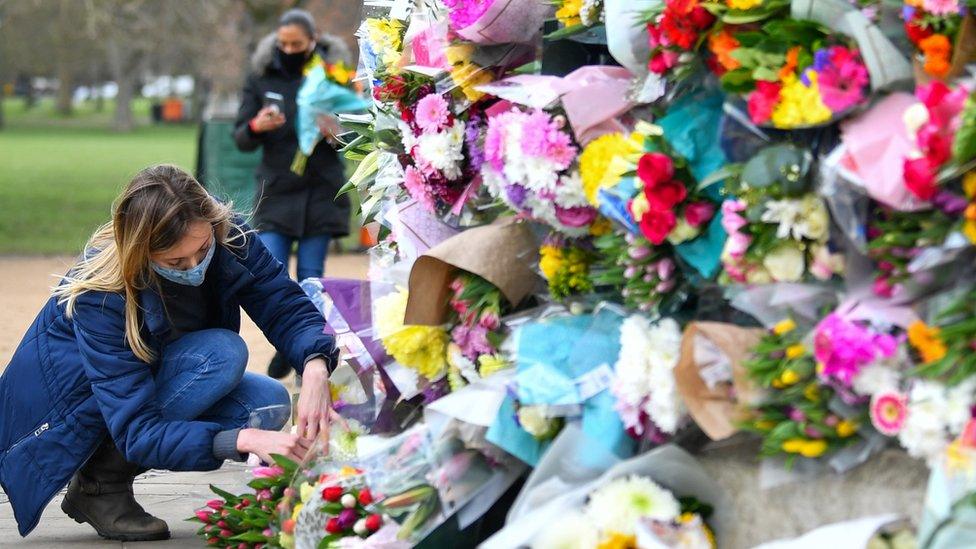
Organisers have urged people to stand on their doorsteps at 21:30 GMT - the time Ms Everard was last seen
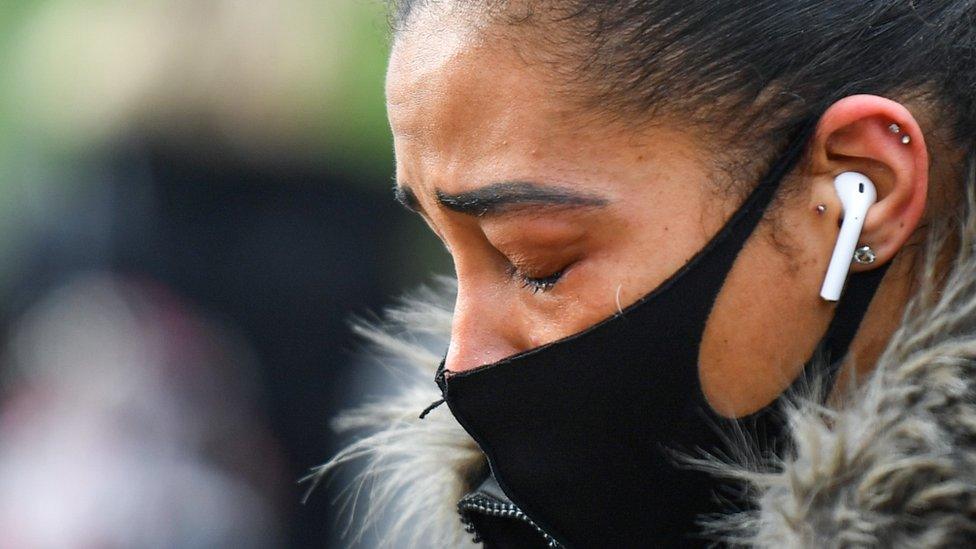
The Met Police said they "take no joy" in the vigil being cancelled but it was the "right thing to do" given the pandemic
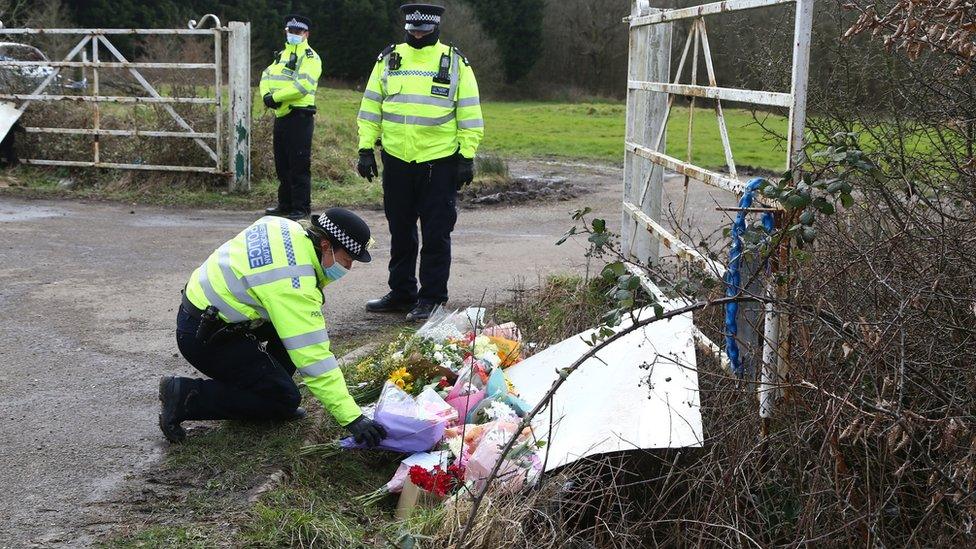
A police officer lays flowers left by members of the public at a site which is being searched in Kent
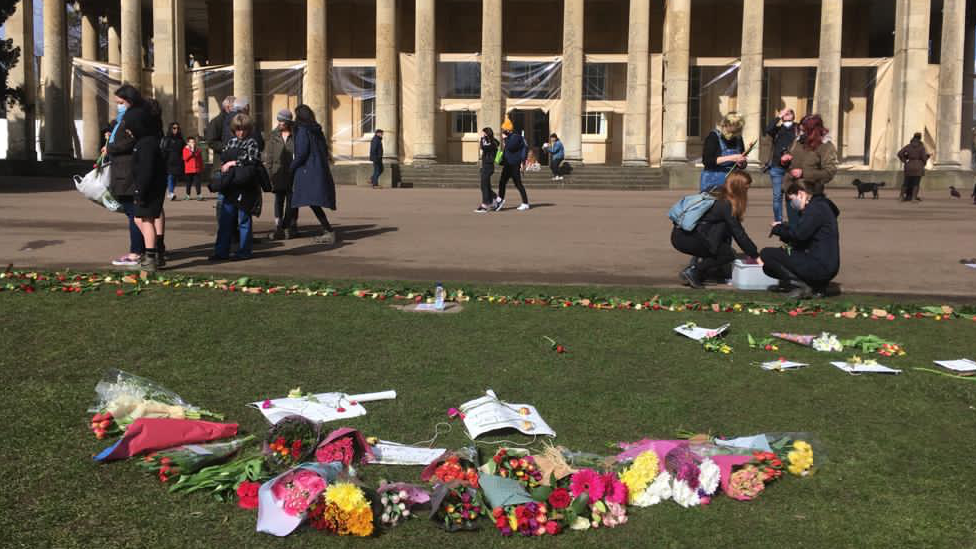
Flowers were also laid in tribute to Ms Everard at Pittville Park in Cheltenham


For almost a year the ambiguities and omissions within the coronavirus restrictions have left both the police and public grasping for answers.
Gatherings in public are generally banned but, at the same time, the rules recognise there can be reasonable excuses to be outside.
The problem is that the law doesn't specify whether a demonstration on a major issue of public importance - such as this vigil - is one of those excuses or not.
Police officers must enforce the lockdown laws and they have been under pressure from ministers to do more to reduce the risk of the virus spreading.
But they also know that the right to protest is enshrined in the Human Rights Act, a cornerstone of our complex constitution.
That means they can't just impose a blanket ban on all protests under the coronavirus restrictions - and the judge in Friday's case urged both sides to keep talking.
In the absence of further legal clarity, the police maintained their position that the balance came down in favour of preventing a gathering, rather than allowing an exception to mark a very exceptional and tragic death.

In the ruling on Friday, Mr Justice Holgate refused an application by Reclaim These Streets for the High Court to make "an interim declaration" that any ban on outdoor gatherings under Covid rules was "subject to the right to protest".
The judge also refused to make a declaration that an alleged policy by the Met Police of "prohibiting all protests, irrespective of the specific circumstances" was unlawful.
Labour's Harriet Harman, who chairs the Joint Committee on Human Rights, said the law on freedom of association amid the coronavirus pandemic should be clarified because a "blanket ban... was not the right way to go".
"The relationship between the Human Rights Act and its protection of freedom of association and the new Covid regulations has not been clearly spelt out," she said.
Caitlin Prowle from Reclaim These Streets says attention should turn to issues such as criminal justice and charity funding
Labour MP Apsana Begum said "our fundamental right to protest is under attack" and the government was proposing to strengthen its powers on protests via the Police, Crime, Courts and Sentencing Bill, external on Monday.
Liberal Democrats deputy leader Daisy Cooper tweeted, external: "It is the Govt's responsibility to ensure people can protest safely."
Senior Conservative MP Caroline Nokes, who had previously said she asked Home Secretary Priti Patel to "step in" and allow the vigil to go ahead, said she hoped people would now take the advice of organisers to gather virtually instead to "recognise the ongoing issue there is with violence against women and girls, perpetrated by men".
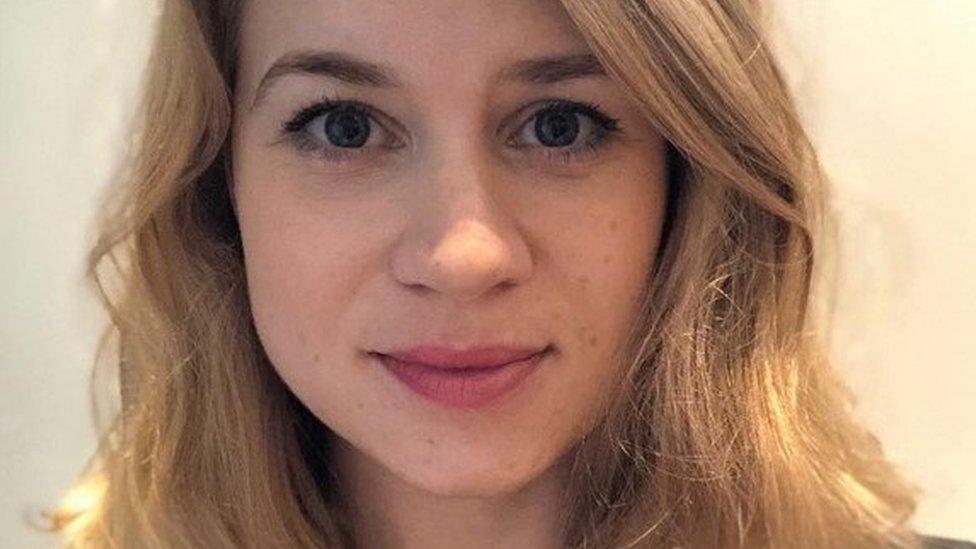
Sarah Everard had been walking to her home in Brixton when she disappeared

What are the rules on gatherings in England?
Under the current lockdown rules two people can meet for recreation outside, which can include "coffee on a bench"
From 29 March people will be allowed to meet outdoors, either with one other household or within the "rule of six"
Police can break up illegal gatherings and issue fines of £10,000 to someone holding a gathering of more than 30 people
During last year's restrictions, when Black Lives Matter and anti-lockdown demonstrations took place, police took a hands-off approach to protests


Related topics
- Published30 June 2022
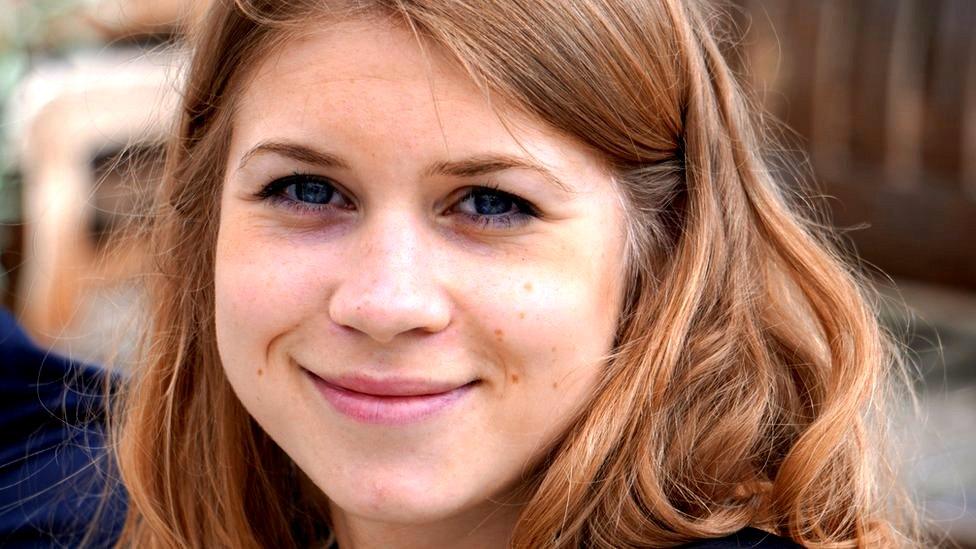
- Published11 March 2021
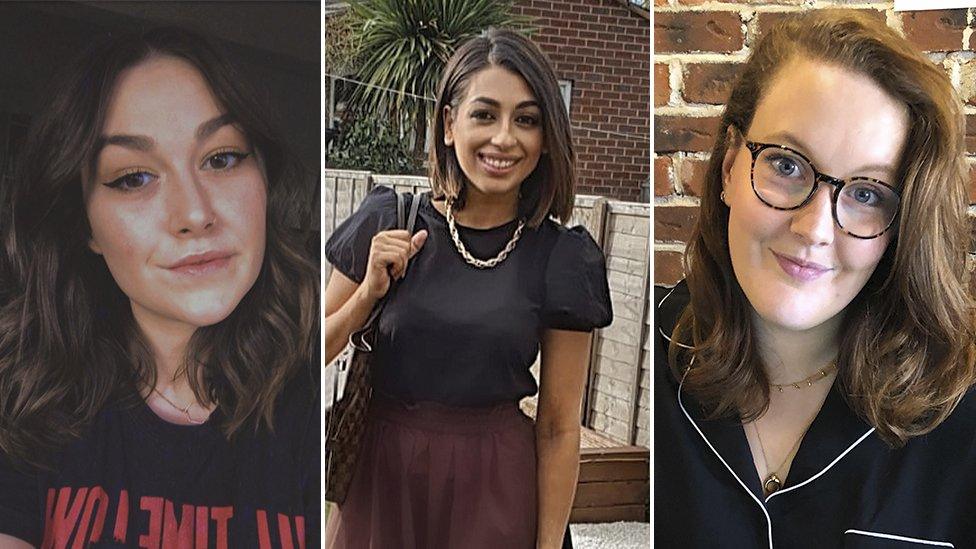
- Published12 March 2021
